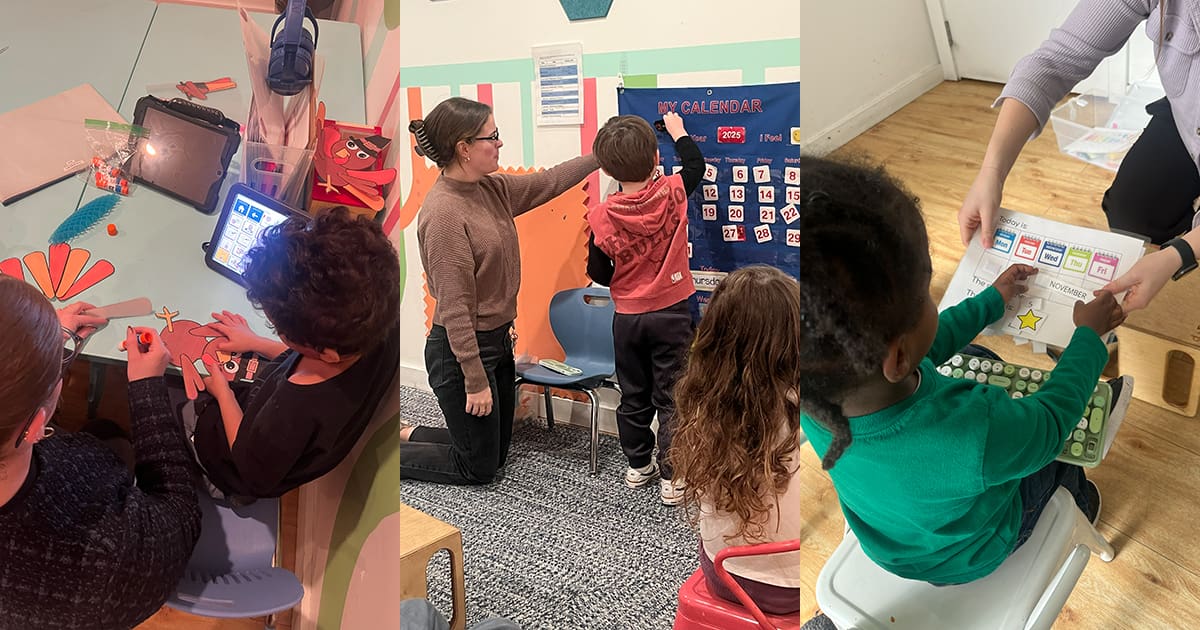Share this Post

When parents enroll their child in a therapeutic day program, they often wonder who will be working with their child and how these professionals will support their development. Unlike traditional preschool or daycare settings, therapeutic day programs provide specialized care from a multidisciplinary team of experts who work together to address each child’s unique needs.
At CST Academy, our team includes highly trained professionals in speech therapy, occupational therapy, behavioral support, early childhood education, and developmental intervention. These experts collaborate to create a nurturing, structured environment that helps children develop the skills they need to thrive in school and everyday life.
This guide explores the key professionals who work in a therapeutic day program, their roles, and how they contribute to a child’s growth and success.
The Multidisciplinary Team in a Therapeutic Day Program
Therapeutic day programs bring together a team of specialists who focus on different aspects of a child’s development. These professionals work collaboratively to ensure that children receive individualized support in all areas, including communication, motor skills, social-emotional development, and behavior regulation.
1. Speech-Language Pathologists (SLPs)
Role: Speech-language pathologists, commonly known as SLPs, help children develop and improve their communication skills. They work with children who have speech delays, language processing challenges, difficulty expressing thoughts, and social communication difficulties.
How They Help:
- Assess a child’s speech and language abilities and create individualized treatment plans
- Help children pronounce words clearly and develop expressive language skills
- Teach children how to understand and process spoken language
- Work on social communication skills, such as turn-taking and conversation skills
- Use augmentative and alternative communication (AAC) for children who need nonverbal communication support
SLPs play a critical role in helping children build confidence in their ability to communicate with peers, teachers, and family members.
2. Occupational Therapists (OTs)
Role: Occupational therapists focus on helping children develop the motor, sensory, and self-care skills needed for daily life. They work with children who have sensory processing challenges, motor coordination difficulties, and delays in self-help skills such as dressing and feeding.
How They Help:
- Strengthen fine motor skills needed for writing, using utensils, and manipulating objects
- Improve gross motor skills, including balance, posture, and coordination
- Help children with sensory integration, making it easier to process sounds, textures, and movement
- Support self-care tasks, such as dressing, brushing teeth, and eating independently
- Teach children calming strategies to manage frustration and anxiety
Occupational therapy is essential for helping children gain independence and confidence in their daily routines.
3. Board-Certified Behavior Analysts (BCBAs) and Behavior Therapists
Role: BCBAs and behavior therapists specialize in applied behavior analysis (ABA) and other behavioral interventions that help children develop positive behaviors, self-regulation skills, and social interaction strategies.
How They Help:
- Assess and identify behavioral challenges that may impact learning and socialization
- Develop individualized behavior intervention plans (BIPs)
- Teach self-regulation and coping strategies to help children manage emotions
- Reinforce positive behaviors, such as following instructions, waiting turns, and transitioning between activities
- Provide social skills training to help children interact successfully with peers
For children with autism spectrum disorder (ASD) or behavioral challenges, behavior therapists offer structured support that helps them succeed in a learning environment.
4. Early Childhood Special Education Teachers
Role: Early childhood special education teachers create and lead developmentally appropriate lessons and activities that support children’s cognitive, social, and emotional growth. They adapt learning strategies to meet each child’s unique learning style and abilities.
How They Help:
- Plan and implement structured learning activities tailored to each child’s needs
- Use play-based learning techniques to support cognitive and language development
- Adapt lessons to accommodate children with sensory, speech, or motor challenges
- Reinforce therapy goals within the classroom setting
- Foster a positive, inclusive learning environment where children feel safe and encouraged
Teachers in a therapeutic day program work closely with therapists to ensure that each child’s learning experience is personalized and engaging.
5. Physical Therapists (PTs)
Role: Physical therapists focus on improving a child’s mobility, strength, and coordination. They help children who have difficulty walking, running, or participating in physical activities due to motor delays or conditions that affect movement.
How They Help:
- Assess and develop personalized movement plans to improve strength and coordination
- Help children develop balance, posture, and core stability
- Use fun, engaging activities like obstacle courses and movement-based games to encourage participation
- Work on body awareness and motor planning, which are critical for participating in school and play activities
- Support children in gaining the physical confidence needed to explore their environment
For children with gross motor delays, low muscle tone, or coordination difficulties, physical therapy provides valuable support in improving mobility and independence.
6. Feeding Therapists
Role: Feeding therapists, often speech-language pathologists (SLPs) or occupational therapists (OTs) with specialized training, help children who experience difficulty eating, chewing, swallowing, or transitioning to solid foods.
How They Help:
- Work with children who have oral-motor challenges affecting their ability to chew and swallow
- Help children overcome food texture sensitivities and expand their diet
- Teach safe feeding techniques for children who have difficulty swallowing
- Develop strategies to help children feel comfortable with mealtime routines
Feeding therapy is essential for children with sensory feeding challenges, medical conditions affecting swallowing, or delayed oral-motor development.
7. Social Workers and Family Support Specialists
Role: Social workers and family support specialists help guide and empower families throughout their child’s therapy journey by providing resources, emotional support, and advocacy.
How They Help:
- Assist families in understanding their child’s therapy plan and progress
- Connect parents with resources, educational support, and community programs
- Offer guidance on transitioning into school settings or other services
- Provide emotional support and coaching for parents navigating therapy decisions
Family involvement is a crucial part of a child’s progress, and social workers play a vital role in ensuring that families have the tools and knowledge to support their child’s success.
How a Multidisciplinary Team Supports Your Child’s Growth
The collaboration between speech therapists, occupational therapists, behavior specialists, teachers, and other professionals in a therapeutic day program ensures that each child’s developmental needs are addressed holistically. The benefits of this multidisciplinary approach include:
- Comprehensive support for all aspects of a child’s growth.
- Seamless integration of therapy and education into daily activities.
- A personalized, team-based approach that adapts to each child’s progress.
- Faster skill development due to consistent reinforcement across different therapy disciplines.
Choosing the Right Therapeutic Day Program for Your Child
If your child needs specialized support for speech, motor skills, behavior, or social development, a therapeutic day program can provide the structured, individualized care they need.
At CST Academy, our expert team works together to create a nurturing, engaging environment where children feel safe, encouraged, and supported in reaching their full potential.
Contact CST Academy today to learn more about our therapeutic day program and how our multidisciplinary team can help your child thrive.
Discover Our Pediatric Therapy & Autism Care
ABA Therapy
Support for children with autism.
Autism Evaluation
Expert assessments to identify child needs.
Pediatric Therapy Services
Speech, Occupational, Feeding, and Physical Therapy.
Therapeutic Preschool
A classroom environment designed for early learners with unique needs.

Find the Best Care for Your Child




